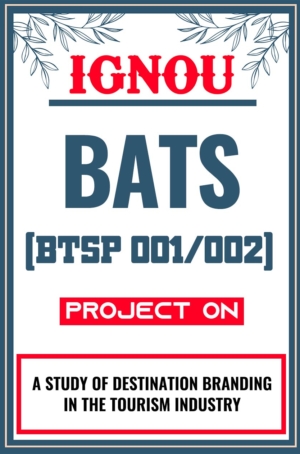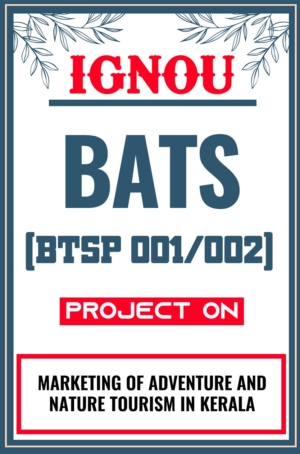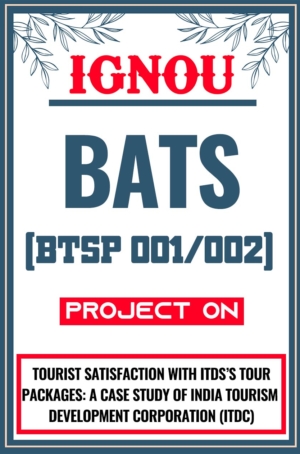Download IGNOU BATS Project (BTSP 001/002)
The IGNOU BATS Project (BTSP 001/002) is a crucial part of the BATS (Bachelor of Arts in Tourism Studies) Program, which is made for people who want to work in the travel and tourism industry at whatever level they want. The program’s goals are to teach you about different parts of tourism, raise awareness about tourism, give you basic training in organizing tourism services, and help you find a job, which should be reflected in the IGNOU BATS Project (BTSP 001/002). The program will help people who want to work (directly or indirectly) in the tourism industry, want to make a job in the tourism industry, run their own businesses that offer tourism-related services, or want to start their own business. The IGNOU BATS Project (BTSP 001/002) will also help people who work on tourism awareness projects or study and want to improve their travel and tourism knowledge and skills.
Whatsapp us to get the Personalized (Customized) or Readymade IGNOU BATS Project Report or BATS Synopsis
How do you choose a topic for your IGNOU BATS Project (BTSP 001/002)?
Choosing a topic for your BATS project is a crucial step that sets the foundation for your research. Here are some tips to help you select an appropriate and engaging topic:
Tips for Choosing a Topic
Interest and Passion:
Choose a topic that genuinely interests you. Your passion for the subject will keep you motivated throughout the research process.
Relevance to Tourism Studies:
Ensure the topic is relevant to the field of tourism. It should contribute to the understanding or development of tourism practices, policies, or theories.
Feasibility:
Consider the feasibility of the topic. Ensure you have access to the necessary resources, data, and time to complete the research.
Scope:
Define a clear and manageable scope. Avoid topics that are too broad or too narrow. A focused research question will lead to a more in-depth study.
Current Trends and Issues:
Look into current trends, challenges, and issues in the tourism industry. Topics that address contemporary problems or emerging trends can be very impactful.
Literature Availability:
Ensure there is sufficient existing literature on the topic. A good literature base will help you frame your research and provide a solid foundation for your study.
Originality:
Aim for originality. Try to find a unique angle or perspective on a topic that hasn’t been extensively covered.
Guidance from Supervisors:
Discuss potential topics with your academic supervisor. They can provide valuable insights, suggest relevant topics, and help refine your ideas.
IGNOU BATS Project Topics
- Increase In Tourism Of Kerala
- Potentials And Attractions Of Pilgrimage Tourism In Delhi
- Health Tourism In India: An Exploratory Study
- To Study Of Marketing Strategies For The Development Of Tourism
- Tourist Satisfaction With Itdc Tour Packages: A Case Study Of India Tourism Development Corporation (Itdc) New Delhi
- Marketing Of Adventure And Nature Tourism
- A Study Of Destination Branding In The Tourism Industry
- Effect Of The Internet On The Marketing Of Hotels And Tour Operators In City New Delhi
- To Study The Tourism Possibilities In The Poonch Sector
- Government Policies Adopted For The Promotion Of Tourism In Jammu And Kashmira Study About Religious Sites Of Jammu & Kashmir For Pilgrimage Tourism
- A Study To Analyze The Influence Of Tourism On The Environmental Conditions In The City New Delhi
What should you do if you need an extension for your IGNOU BATS Project submission?
If you require an extension for your project submission, contact your academic supervisor and explain the reasons for the delay. Follow the procedures outlined by IGNOU for requesting an extension.
What are the primary and secondary sources of data?
Primary and Secondary Sources of Data
When conducting research for your BATS project, you will need to gather data to support your study. Data can be categorized into two main types: primary and secondary sources. Understanding the differences between these sources and how to use them effectively is crucial for a successful project.
Primary Sources of Data
Primary sources are original data collected directly by the researcher for a specific purpose. These sources provide firsthand information and are often tailored to the specific research question.
Examples of Primary Sources:
Surveys:
- Structured questionnaires distributed to a specific group of people to gather quantitative data.
- Example: Surveying tourists about their satisfaction with local accommodations.
Interviews:
- Conducting one-on-one or group interviews to gather in-depth qualitative data.
- Example: Interviewing local business owners about the impact of tourism on their operations.
Observations:
- Directly observing behaviors, events, or conditions in a natural setting.
- Example: Observing tourist behavior in a heritage site to study visitor engagement.
Focus Groups:
- Conducting group discussions to gather diverse perspectives on a specific topic.
- Example: Organizing a focus group with tourists to discuss their experiences with local tour services.
Experiments:
- Conducting controlled experiments to test hypotheses in a structured manner.
- Example: Experimenting with different marketing strategies to see which one attracts more tourists.
Fieldwork:
- Collecting data directly from the field or site of study.
- Example: Visiting a tourism destination to collect data on visitor numbers and activities.
Secondary Sources of Data
Secondary sources are data that have already been collected and published by others. These sources provide secondhand information and are often used to support and contextualize primary data.
Examples of Secondary Sources:
Books:
- Published works on various topics that provide comprehensive information and insights.
- Example: Using a book on sustainable tourism to support your literature review.
Journal Articles:
- Peer-reviewed articles that present original research, reviews, and theoretical discussions.
- Example: Citing journal articles on tourism marketing strategies to support your research findings.
Reports:
- Government, industry, and organizational reports that provide detailed data and analysis.
- Example: Utilizing a government report on tourism statistics to contextualize your primary data.
Online Databases:
- Digital repositories that offer access to a wide range of academic and industry publications.
- Example: Accessing tourism-related studies from online databases like JSTOR or Google Scholar.
Websites:
- Websites of reputable organizations, agencies, and institutions that provide relevant information.
- Example: Referencing data from the World Tourism Organization’s website for global tourism trends.
Newspapers and Magazines:
- Articles and features in print and online media that cover current events and trends.
- Example: Using a magazine article on recent travel trends to support your topic on adventure tourism.
Conference Papers:
- Papers presented at academic and industry conferences that offer insights into recent research and developments.
- Example: Citing a conference paper on tourism policy to enhance your project’s theoretical framework.
What is the structure of the IGNOU BATS Project Report (BTSP 001/002)?
The project report should include the following sections:
- Title Page
- Certificate of Authenticity
- Acknowledgements
- Table of Contents
- Abstract
- Introduction
- Literature Review
- Research Methodology
- Data Analysis
- Findings
- Conclusions and Recommendations
- References
- Appendices
How do you ensure your IGNOU BATS Project report is well-organized and error-free?
Here are some tips to ensure your IGNOU BATS Project report (BTSP 001/BTSP 002) is well-organized and error-free:
Structure and Organization:
- Follow the prescribed format: Ensure your report adheres to the structure outlined in the IGNOU BATS Project Guide. This typically includes sections like Introduction, Literature Review, Methodology, Data Analysis & Interpretation, Findings & Discussion, Conclusion & Recommendations, References, and Appendices (if applicable).
- Logical flow: Make sure your report flows logically from one section to the next. Each section should build upon the previous one, leading to a clear and concise conclusion.
- Use headings and subheadings: Break down your report into clear sections using headings and subheadings. This enhances readability and helps navigate your report.
Error-free writing:
- Proofread meticulously: Proofread your report thoroughly for typos, grammatical errors, and spelling mistakes. Consider having someone else review it for a fresh perspective.
- Maintain consistent referencing: Ensure your citations are consistent and follow the referencing style (APA or MLA) outlined in the IGNOU BATS Project Guide.
- Clear and concise language: Use clear and concise language throughout your report. Avoid jargon and overly complex sentences.
What are the evaluation criteria for the IGNOU BATS Project (BTSP 001/002)?
The grading of your IGNOU BATS project (BTSP 001/BTSP 002) will be based on various criteria that assess the overall quality, academic integrity, and the depth of your work. While the specific criteria might differ slightly depending on the year’s guidelines, here’s a breakdown of the general areas typically evaluated:
Content and Relevance:
- Topic Selection: The significance of your chosen topic within the tourism domain. A well-defined and relevant topic demonstrates a clear understanding of the field.
- Research Objectives & Questions: Clarity and precision of your research objectives and questions. These should be well-defined and guide your investigation.
- Literature Review: Demonstrates a thorough understanding of existing research related to your topic. Ensure you cite credible sources and effectively integrate them into your report.
- Methodology: The appropriateness and effectiveness of the methods used to collect and analyze your data.
- Data Analysis & Interpretation: Your ability to analyze and interpret the collected data to draw meaningful conclusions.
- Findings & Discussion: The quality of your findings and how well you discuss their significance in relation to your research objectives and the broader tourism field.
- Conclusion & Recommendations: A well-supported conclusion that summarizes your key findings and practical recommendations based on your research.
Presentation and Writing Style:
- Structure & Organization: Logical flow and adherence to the prescribed format as outlined in the IGNOU BATS Project Guide.
- Clarity & Conciseness: The use of clear, concise, and error-free language throughout the report.
- Referencing: Consistent and accurate citations following the referencing style (APA or MLA) specified in the guidelines.
- Originality: The authenticity of your work. It should be free from plagiarism and reflect your own research and analysis.
Overall Impression:
- Depth of Research: The comprehensiveness of your research and the critical thinking skills demonstrated in your analysis.
- Presentation: Overall neatness, use of visuals (if applicable), and adherence to formatting guidelines.
How can you manage your time effectively during the IGNOU BATS Project (BTSP 001/002)?
Here are some strategies to effectively manage your time during your IGNOU BATS Project (BTSP 001/BTSP 002):
Planning and Scheduling:
- Break down the project into manageable tasks: Divide the project into smaller, more manageable tasks. This will make it feel less overwhelming and help you track progress.
- Develop a timeline: Create a realistic timeline for completing each task. Allocate sufficient time for research, writing, editing, and proofreading. Tools like calendars, planners, or project management apps can be helpful for creating and managing your schedule.
- Set daily or weekly goals: Set realistic daily or weekly goals for completing specific tasks. This will help you stay on track and avoid procrastination.
Prioritization and Focus:
- Identify the most important tasks: Prioritize the most critical tasks that need immediate attention.
- Minimize distractions: Schedule dedicated time for working on your project and minimize distractions like social media or phone notifications.
- Utilize dedicated work sessions: Set aside focused work sessions for research, writing, or editing. During these sessions, avoid multitasking and concentrate solely on the project at hand.
Utilize Resources:
- Seek guidance from your project coordinator: Don’t hesitate to reach out to your project coordinator for guidance or clarification on project requirements.
- Explore online resources: Utilize online resources like IGNOU websites, tourism industry journals, and credible academic databases for research purposes.
- Consider group study (optional): If you find it helpful, consider forming a study group with other BATS students to discuss research findings or brainstorm ideas. This can keep you motivated and accountable.
Maintaining Consistency:
- Work on the project regularly: Dedicate some time regularly to work on your project, even if it’s just for a short period each day. This helps maintain momentum and prevents last-minute cramming.
- Take breaks: Schedule regular breaks to avoid burnout. Taking short breaks can help you stay refreshed and focused during work sessions.
- Be flexible: While a schedule is important, be prepared to be flexible and adjust your timeline as needed. Unexpected events might arise, so some buffer time in your schedule is helpful.
Get your IGNOU BATS Project Synopsis & Report Sample PDF (BTSP 001/002)
- Call us or WhatsApp us at: 9958947060, 9354637830
- Visit: SHRICHAKRADHAR.COM
-
Sale!

-
Sale!

IGNOU BATS Project (BTSP 001/002) Synopsis/Proposal & Project Report/Dissertation in Soft-Copy (Sample-7)
Original price was: ₹499.00.₹149.00Current price is: ₹149.00. -
Sale!

IGNOU BATS Project (BTSP 001/002) Synopsis/Proposal & Project Report/Dissertation in Soft-Copy (Sample-6)
Original price was: ₹499.00.₹149.00Current price is: ₹149.00. -
Sale!

IGNOU BATS Project (BTSP 001/002) Synopsis/Proposal & Project Report/Dissertation in Soft-Copy (Sample-5)
Original price was: ₹499.00.₹149.00Current price is: ₹149.00. -
Sale!

IGNOU BATS Project (BTSP 001/002) Synopsis/Proposal & Project Report/Dissertation in Soft-Copy (Sample-4)
Original price was: ₹499.00.₹149.00Current price is: ₹149.00. -
Sale!

IGNOU BATS Project (BTSP 001/002) Synopsis/Proposal & Project Report/Dissertation in Soft-Copy (Sample-3)
Original price was: ₹499.00.₹149.00Current price is: ₹149.00. -
Sale!

IGNOU BATS Project (BTSP 001/002) Synopsis/Proposal & Project Report/Dissertation in Soft-Copy (Sample-2)
Original price was: ₹499.00.₹149.00Current price is: ₹149.00. -
Sale!

IGNOU BATS Project (BTSP 001/002) Synopsis/Proposal & Project Report/Dissertation in Soft-Copy (Sample-1)
Original price was: ₹499.00.₹149.00Current price is: ₹149.00.








